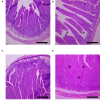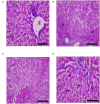Effect of Organic Selenium-Enriched Yeast on Relieving the Deterioration of Layer Performance, Immune Function, and Physiological Indicators Induced by Heat Stress
- PMID: 35573399
- PMCID: PMC9096893
- DOI: 10.3389/fvets.2022.880790
Effect of Organic Selenium-Enriched Yeast on Relieving the Deterioration of Layer Performance, Immune Function, and Physiological Indicators Induced by Heat Stress
Abstract
Heat stress (HS) induces deleterious effects on the performance of laying hens and causes economic losses for poultry industry. This study was carried out to investigate the organic effect of selenium-enriched yeast (SY) on relieving the performance, immunity and physiological deterioration induced by heat stress in laying hens. A total of 324, 28-week-old, Hy-Line Brown commercial chicken layers were randomly distributed into 4 treatments according to a 2 × 2 factorial design, with 9 hens × 9 replicates per treatment (n = 81). From 30 to 34 weeks of age, layers were exposed to 2 temperature treatments (the HS treatment groups): a thermoneutral temperature at 24°C and a heat stress at 35°C. Layers were further assigned into the 2 subgroups according to dietary supplementation with organic selenium-enriched yeast (the SY treatment groups) at either 0 or 0.4 mg/kg diet. Results indicated that all the aspects of the layer performance during the experimental period were impaired by exposure to HS, while SY supplementation improved the layer performance in both the HS and non-HS layers. Intestinal villi disruptions and liver necrotic hepatocytes were observed in the layers exposed to HS, while villi integrity and hepatocytic normality were enhanced by SY treatment. A significant (P < 0.05) decrease in the total leukocyte count, sheep red blood cell (SRBC) antibody titer, and T- and B-lymphocyte proliferation along with an increase in the heterophils/lymphocytes (H/L) ratio were observed in the HS layers compared to non-HS layers. On the contrary, SY treatment significantly (P < 0.05) improved the immune function traits in both the HS layers and non-HS layers. Furthermore, the SY treatment plays an important role in mitigating the oxidative stress and inflammation induced by HS, displaying lower levels of plasma corticosterone, lipid peroxidation, interleukin-1β, and tumor necrosis factor-α in HS layers supplemented with SY compared to HS layers without SY supplementation. These results conclude that addition of SY to the diet of laying hens could be applied as a potential nutritional approach to relieve the deterioration effects of heat stress on the immunity, physiological status, and productive performance of laying hens.
Keywords: heat stress; immunity; laying hens; organic selenium; physiology; productive performance.
Copyright © 2022 Abbas, Alaqil, Mehaisen and El Sabry.
Conflict of interest statement
The authors declare that the research was conducted in the absence of any commercial or financial relationships that could be construed as a potential conflict of interest.
Figures


References
-
- Abd El-Hack ME, Mahrose K, Arif M, Chaudhry MT, Saadeldin IM, Saeed M, et al. Alleviating the environmental heat burden on laying hens by feeding on diets enriched with certain antioxidants (vitamin E and selenium) individually or combined. Environ Sci Pollut Res Int. (2017) 24:10708–17. 10.1007/s11356-017-8690-5 - DOI - PubMed
-
- Abd El-Hack ME, Mahrose K, Askar AA, Alagawany M, Arif M, Saeed M, et al. Single and combined impacts of vitamin a and selenium in diet on productive performance, egg quality, and some blood parameters of laying hens during hot season. Biol Trace Elem Res. (2017) 177:169–79. 10.1007/s12011-016-0862-5 - DOI - PubMed
-
- Bozkurt M, Küçükyilmaz K, Çatli AU, Çinar M, Bintaş E, Çöven F. Performance, egg quality, and immune response of laying hens fed diets supplemented with mannan-oligosaccharide or an essential oil mixture under moderate and hot environmental conditions. Poult Sci. (2012) 91:1379–86. 10.3382/ps.2011-02023 - DOI - PubMed
LinkOut - more resources
Full Text Sources

